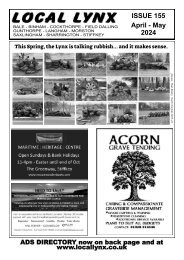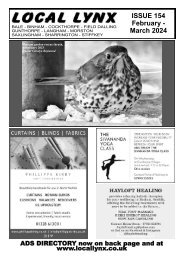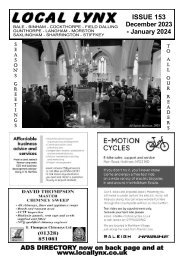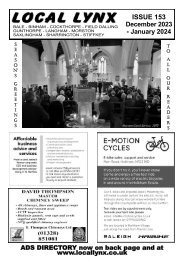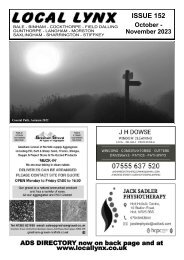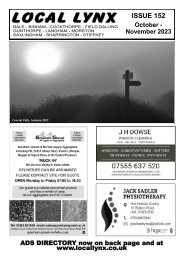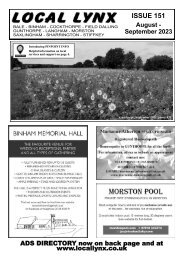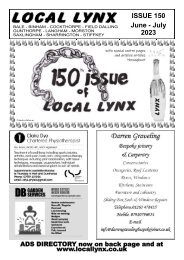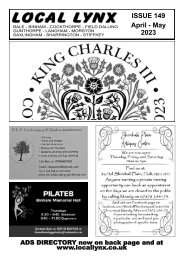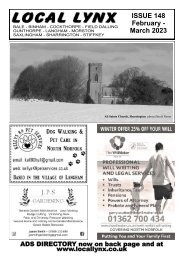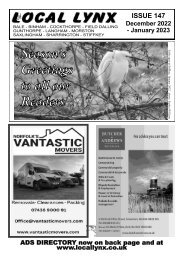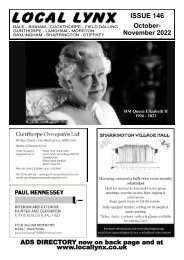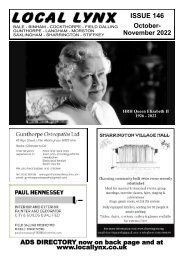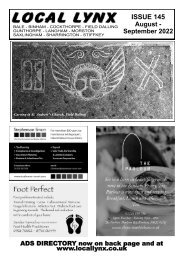Local Lynx No.129 December 2019/January 2020
The community newspaper for 10 North Norfolk villages.
The community newspaper for 10 North Norfolk villages.
- No tags were found...
Create successful ePaper yourself
Turn your PDF publications into a flip-book with our unique Google optimized e-Paper software.
and generally take care of what we had grown. The
hedge rows gave an abundance of good food in season.
Even so, mothers were experimenting and finding new
ways to produce food for the table. Mother had
managed to extract syrup from sugar beet found fallen
off the carts onto the road. I was not keen to use it in my
tea, but preferred a spoonful of jam. We fished and
those fish we had long caught were a welcome addition.
An eel I caught in the stream near the recreation ground
was gladly taken and made into a meal for us. Once a
carton of jars of jam fell off the vehicle when unloading
at the Coop at Melton. Father was one of the lucky ones
and acquired a few jars, and Mother spent hours trying
to extract the broken glass from the mess. She was fairly
successful with the exception of a few small fragments.
At the time we were sheltering Mother’s sister and her
Navy husband from the bombing in London - he was
the lucky one and found a piece of glass on his toast.
Mother now became scared that he might take it up with
the Coop and that Father could get into trouble.
With the heavy bombing of London and Northern towns
Mother took in some of her relations from time to time to
give them respite. It must have been quite a challenge to
feed us all at the time, not to mention the accommodation.
Their ration books had to be registered with one of the local
shops. I expect ours was the Coop at Melton, but it could
have been Mrs Sexton in Hall Street, since I have no
recollection. Coupons were needed for some foods and
points for others, such as tinned meats and dried fruits, most
of which came in from the USA. Having to come across the
Atlantic the ships were subject to attack by German U Boats
and many ship's and crew's were lost just bringing in food to
keep the nation fed, so these foods could not be relied on on
a regular basis. Monthly you might have the points but there
was nothing to spend them on, neither could they be carried
over to the next month. There was little point in getting
more than one could eat at the time, no freezers then. Bread
was not actually rationed, though controlled by the baker
who saw that everyone got their fair share. The flour was
National flour, and it contained much of the bran that had in
the past gone to animal foods, though I am sure it was much
healthier for us. It has since been recorded the outcome of
the war rationing was that people were living to a greater
age and the young were healthier with less problems. There
was a little white flour for a few luxuries, and one of my
first jobs in a bake house found me taking white flour to a
certain house in a nearby village in exchange for chocolate
from London. I wonder who remembers the sweet man at
Hunworth? The rest of any white flour was used to make
those buns with a few currants inside and a shiny top. When
they were on the shelf our baker had many friends. Bread
was not on ration until 1954, and making it rationed was
nothing to do with WW2, but a worldwide shortage of
wheat. Bacon, butter, and sugar were restricted first,
followed by other goods including sweets, petrol, soap, and
furniture. A manufacturer of furniture was called Utility
Furniture. It had a noticeable brand mark with the words
Utility displayed.
Many changes had taken place in the early days of
the war - things that had stood still from time that
seemed immemorial, had now taken a change never
19
envisaged especially from the older generation. The
Land Army had been reformed, and by 1943 87,000
women had joined and were contributing to the war
effort on the farms about the countryside - many doing
the work normally attributed to the men. Milking forty
cows by hand before breakfast must have taken
dedication to say the least. Mrs Ada Fisher was one of
those women and cycled morning and night to the Dairy
Farm with her comrade to hand-milk a large heard of
cows.
JB
LANGHAM
Contact: Christina Cooper 01328 830207
christinacooper27@googlemail.com
FRIENDS OF LANGHAM
200 Club Draw Winners
September 2019 £20 October 2019 £10
81 Mr D Tombling 180 Mrs B Newman
67 Mr C Sherriff 51 Mrs K Tombling
103 Mr P Adams 76 Mrs Warwick
187 Mr&Mrs R Allen
143 Mr J Laurence
186 Mrs B Newman
FOL Committee
FROM THE REGISTERS
Holy Baptism
Liam and Jaxon Lees 6th October 2019



